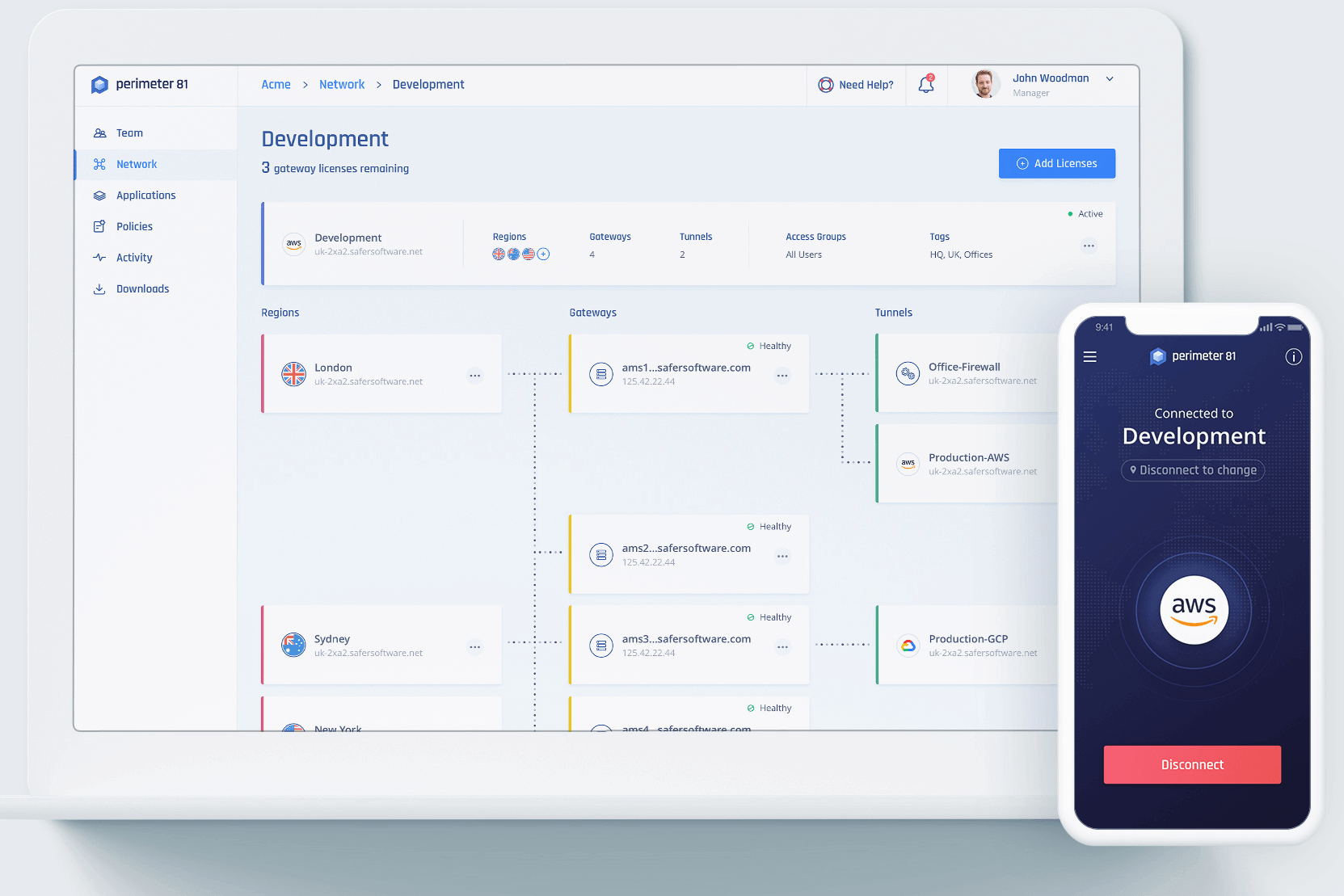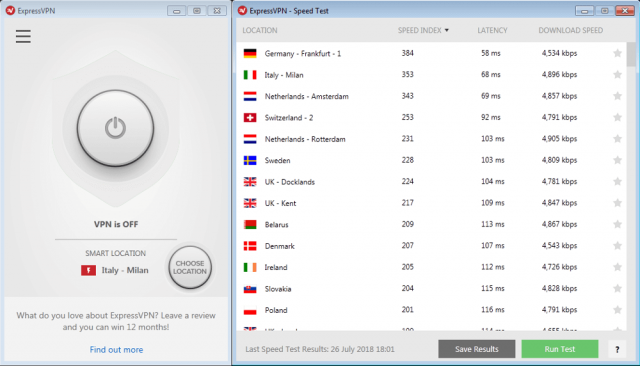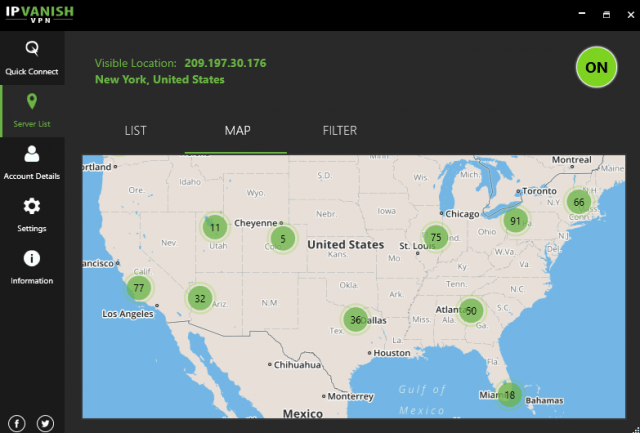

Best VPNs for Business
source link: https://tech.co/vpn/best-vpns-business
Go to the source link to view the article. You can view the picture content, updated content and better typesetting reading experience. If the link is broken, please click the button below to view the snapshot at that time.
Best VPNs for Business
Find the perfect VPN and security solution for your business. We look at market leaders including Perimeter 81 and NordLayer.

In these times of increased remote working, businesses can’t afford to take risks with the security of their networks or data. This is where a business VPN can be invaluable.
Perimeter 81 is, in our mind, the best VPN solution for businesses – principally because it offers more than just a VPN. In short, it offers an exceptional complete network security system.
Perimeter 81’s system can cost small businesses as little as $80 per month. When you consider the potential cost of security breaches, $80 per month seems trifling.
However, there are companies that will offer cheaper VPNs for businesses than Perimeter 81 – and they might even be a better fit for your business’ needs. Read on to learn our pick of the best business VPNs, plus which features to focus on when choosing one for your business.
Perimeter 81
Perimeter 81 is a great choice for businesses of all sizes. Its zero-trust security model means you’ll have exceptional security even within its network. This should make managing the system easy for your IT department.
Its cloud-based system is super easy to set up for any business. Plus, you can connect almost any device to the network – Perimeter 81 offers support for Windows PCs, Macs, iPhones, Android devices, Chromebooks, and even Linux devices. It also has a strict no-logging policy, and uses 256-bit encryption for top security.

Perimeter 81 Pricing
Perimeter 81 has three pricing plans:
- Essentials – $8 per month per user when paid annually. Minimum of 5 users.
- Premium – $12 per month per user when paid annually. Minimum of 10 users.
- Enterprise – Custom pricing for businesses with more than 50 employees.
All of these plans also charge $40 per month per gateway. The Premium plan is probably the best value for money, offering prioritized email support in the event of a problem. All of the plans offer split-tunneling and two-factor authentication.
PureVPN for Teams
PureVPN isn’t just a fantastic VPN for individual consumers – it offers a brilliant business service as well. Like Perimeter 81, PureVPN has a strict no-logging policy, and offers 256-bit encryption. PureVPN also works with 90,000+ ethical hackers to make sure its security remains top-drawer.
With its VPN for Teams solution, PureVPN will allow you to secure wifi connections and keep all your business data encrypted. You can use PureVPN for Teams on Windows, Mac, Android, iOS, and Linux. Plus, it offers extensions for Chrome and Firefox.
It also offers split tunneling, 24/7 support, and an intrusion prevention system which proactively protects your network from unauthorized individuals.

NordLayer
NordLayer prides itself on being a super easy to use business VPN solution. Its central control panel makes managing user accounts and controlling permissions a breeze. Plus, you can use it to create gateways, and manage where your dedicated servers are in the world.
What’s more, NordLayer will give you a dedicated account manager to help make your experience as painless as possible. It also offers 24/7 support by phone, email, or live chat.
It offers 256-bit encryption and works with loads of devices, including Windows PCs, Macs, iOS, and Android devices. As it stands, NordLayer doesn’t currently offer two-factor authentication or a kill switch, though it assures us these features are coming soon.

NordLayer Plans and Pricing
There are three NordLayer pricing plans: Basic, Advanced, and Enterprise. The Basic plan costs $7 per user per month, and gives you all the basic tools (obviously) you need to run a business VPN.
The Advanced plan’s principal benefits are dedicated servers for extra speed and security and custom gateways. These gateways will allow different parts of your business to connect to different servers around the world. The Advanced will cost you $9 per month per user.
The Enterprise plan is a bespoke option and gives you API access, site-to-site VPNs, and the option to set up a dedicated server on your premises.
TorGuard Business VPN
TorGuard Business VPN prides itself on its range of dedicated IP addresses and the number of servers it can offer. With any of the provider’s plans, you’ll have access to 3,000+ servers in more than 50 countries around the world. This means that you should have no problem being able to access websites or connect to colleagues in different countries.
What’s more, on even its cheapest plan, you’ll have access to three dedicated IP addresses – this means you should never experience any downtime, and it gives you extra security to boot.
TorGuard will also give you a 24/7 dedicated account manager, and offers either 128-bit or 256-bit encryption. It works on Mac, Windows, Linux, Android, and iOS. It also offers extensions for Safari and Firefox.

TorGuard VPN Pricing
Pricing starts from $69 per month with the Starter plan. This gives you 10 user accounts, 10 email accounts, and three dedicated IPs. The Small plan gives you 15 users, 15 email accounts, and five dedicated IPs for $110 per month. The Medium plan gives you 20 email and user accounts, plus 10 dedicated IP addresses, and costs $169 per month. There’s also a custom Enterprise plan, which can give you all the user and email accounts and IP addresses you need.
ExpressVPN
All right, so ExpressVPN doesn't technically have a business-facing plan for its VPN. However, if you're operating a small team that you're confident can be in charge of their own security, ExpressVPN is actually a truly impressive option that could be a better fit for you.
For one, it can be used on a staggering number of devices and operating systems. In addition to the standard (Windows, Android, iOS, macOS, etc), ExpressVPN works with Linux, Kindle Fire, Chromebook, and Nook, just to name a few.
On top of that, ExpressVPN offers some robust security. You'll get advanced features like split-tunneling and kill switches, as well as the peace of mind knowing the ExpressVPN uses its own DNS servers, so there is even less chance of a security breach. The provider now has a Threat Manager too, which will stop your device from communicating with malicious trackers and websites that ExpressVPN has on its blocklist.
Again, its one downfall is that it doesn't offer any business features, but a small, nimble team could be better fitted to a flexible option like ExpressVPN, so it's worth considering.

ExpressVPN Pricing
Because ExpressVPN doesn't have a business-facing plan, it offers the standard pricing for its VPN. It offers a one-month plan at $12.95 per month, as well as a six-month plan for $9.99 per month, and a one-year plan for $8.32 per month. This puts it in the “expensive” category, but it offers a lot, so the value is still pretty solid.
IPVanish
IPVanish is another VPN that is geared towards individuals that still works pretty well for businesses. The main benefit of IPVanish for businesses is that it allows for unlimited devices to be secured simultaneously. Still, the provider does put vague limits on it, saying the accounts are only for households, so you probably want to stick to use in small businesses only.
Outside of that, IPVanish is decidedly easy to set up and even easier to use, providing 24/7 customer support to all users. Plus, the mobile apps are also very intuitive and high quality, so your business' security can be used on-the-go as well as in the office.
Again, the lack of a business plan is a bit of a dealbreaker, particularly because you miss out on features like an admin control panel. However, the unlimited devices allows you to manage everyone from a single account, so at least it's a consolidated option for your security needs.

IPVanish Pricing
IPVanish offers two different pricing plans only, and no specific business facing plan. The first plan is just the VPN plan, which comes in at $3.75 per month. IPVanish also offers a VPN + Backup plan, which costs $4.58 per month, and adds a lot of additional security features, like ransomware protection, remote device wiping, and 500 GB of backup cloud storage.
How do you Choose a Good VPN for Your Business?
Perhaps the most important factors to consider when choosing a VPN for your business are the level of encryption your data will receive, and whether the provider will log your data or not.
“If it’s not encrypted, your company data can be exposed to anyone, and leaves your business open to unauthorized third parties,” says Cian McKenna-Charley, chief marketing officer at RingVPN. “AES-256 bit encryption is suitable for most business needs, and will ensure your data never circulates unencrypted on the network.”
However, when it comes to data-logging, the devil is in the detail. According to McKenna-Charley:
“Whilst a ‘no-log’ policy is almost standard for most consumer VPNs, the interpretation of what this actually means can vary greatly between providers. For example, some no-log VPN providers maintain activity logs for 30 days or more before they are erased.”
Naturally, all of the providers we recommend here use 256-bit encryption. None of them log your data, either.
The next consideration should really be ease of use. Companies shouldn’t be providing their employees with unfathomable tools – if it’s too hard to use, they might not use it at all. In fact, you really want to make sure that connecting to the VPN takes no more than a few clicks. Cloud-based business VPNs, which are fast becoming the norm as workforces become more flexible, are typically easier to use than traditional server-based solutions.
Of course, a network is only as secure as its weakest point, and simply deploying a VPN won’t make your business secure at a stroke.
“Setting up a business VPN is easy,” says McKenna-Charley, “but the biggest challenge is employees changing their behavior from working in an office environment to working from home.”
In fact, the big shift during the pandemic to remote and hybrid work models has made the need for a VPN that much more pressing.
“In an office environment,” McKenna-Charley explains, “networks are far more closely monitored for security by IT staff than they are when employees are working remotely. The first step in changing behavior should be to ensure that all remote workers remember to connect to the internet using a VPN before they begin work. It may be a very simple thing, but this small change in routine will ensure that your data is protected.”
Of course, the next most important factor is cost. As we mentioned above, Perimeter 81’s network security solution is extremely affordable for small businesses, and its $80 per month price is a drop in the ocean compared to the potential losses from a security breach.
“For small businesses, cloud VPNs for businesses are available, which cost less and have shorter setup times compared to traditional business VPNs,” explains Leigh Johnson, head of technology at A&O IT Group. “Traditional VPNs necessitate ample time, effort, and budget to set up, which heavily depends on the size of the organization and the number of servers.”
If you’re a small business looking to get started, we would strongly recommend opting for a cloud-based VPN solution. All of the providers we recommend here, from Perimeter 81 to PureVPN, offer cloud-based products. What’s more, as employees are (generally) working remotely due to COVID-19 at the moment, setting up a cloud-based VPN won’t bring anyone into direct contact with each other.
Business VPN vs Consumer VPN: the main differences
“Business VPNs are typically used to create a secure tunnel for communication between an exterior employee (or an entire remote office) and an interior set of systems,” explains Chris Hykin, technical services director at Stone Group. “This tunnel is then used to transfer data, access secure systems, and provide remote workers with the secure services they require to do their job. This all happens over an encrypted connection.
“Consumer VPNs are quite different from this traditional option,” continues Hykin. “They provide an encrypted route to the internet, either for your own personal privacy, or to bypass any content restrictions there might be. Business VPNs get you into a secure system, while consumer VPNs give you a secure route out – the technology utilized is similar for both.”
Find out more – Best VPNs for Consumers
This secure route into a server gives business VPNs the ability to keep multiple users secure. “While the remote workers who are using local ISP often find network issues, less efficient connectivity and security issues, VPN creates a highly secure network for efficient work and better productivity,” says Johnson.
Of course, simply employing a VPN won’t grant your business’ network complete security – particularly if you have remote workers. “Strong passwords, or some form of multi-factor authentication, are an absolute requirement when extending remote desktop access to home workers,” says Pascal Geenens, security evangelist at Radware. The Google Authenticator app, or a physical key such as Yubikey or Google Titan key, are ideal.
Is a Free VPN a Good Option for Protecting My Business?
To put it simply, no. We wouldn’t even recommend free options to regular consumers, let alone businesses.
Free VPNs often sell your bandwidth to paying customers – giving them extra speed at your expense. Plus, free VPNs track your data usage, which can often be sold to third parties.
Both of these should be reason enough for you to avoid free services. However, some might also issue data caps, which could be irritating to say the least if you’re working on an important project.
Fortunately, the services we’ve recommended above all offer free trials, so you can at least test out these services.
Through masking employees identities when online, it makes them much less susceptible to malicious attacks, therefore reducing the risk to company data and systems.
While their previous reputation may have been less than positive, today VPNs have gained legitimacy, and are seen as many to be an essential tool when operating online.
A network is only as secure as its weakest point, and that shouldn’t be your laptop or phone. Keep your VPN on all the time you’re accessing the internet for work.
This includes ensuring that remote workers are exposing sensitive company data, as well as a suite of admin controls to help manage employees and their connections.
Pricing varies depending on the provider and the tier of the package, but most start at around $7 – $8 per user per month.
Firstly, security. Anonymous internet access means that employees are more protected, as well as company systems and data.
It also means that employees can operate from anywhere in the world, and retain the same levels of access they need without the fear of being blocked due to their geographical location.
It also makes remote access a breeze, dispelling concerns about potential security issues. Employees can even confidently use a public VPN network without worry.
Tom Fogden is a writer for Tech.co with a range of experience in the world of tech publishing. Tom covers everything from cybersecurity, to social media, website builders, and point of sale software when he's not reviewing the latest phones.
Recommend
About Joyk
Aggregate valuable and interesting links.
Joyk means Joy of geeK